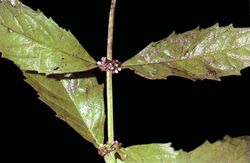Biology:Lycopus uniflorus
| Lycopus uniflorus | |
|---|---|

| |
| Scientific classification | |
| Kingdom: | Plantae |
| Clade: | Tracheophytes |
| Clade: | Angiosperms |
| Clade: | Eudicots |
| Clade: | Asterids |
| Order: | Lamiales |
| Family: | Lamiaceae |
| Genus: | Lycopus |
| Species: | L. uniflorus
|
| Binomial name | |
| Lycopus uniflorus | |
Lycopus uniflorus is a species of flowering plant in the mint family known by the common name northern bugleweed. It is native to much of North America (Canada , United States ) and east Asia (China , Japan , Korea, Russian Far East)
Lycopus uniflorus can be found most often in moist areas, such as marshes. This is a perennial herb growing from a slender rhizome with thickened, tuberlike tips. The plant grows upright 10 to 50 centimeters tall. Its stem is lined with pairs of toothed leaves with heads of flowers in their axils. The flower is white and a few millimeters in length.
The root of the plant was used as a food by several Native American groups.[1] The tubers can be peeled and eaten raw, or pickled.[2]
References
- ↑ Ethnobotany
- ↑ Elias, Thomas S.; Dykeman, Peter A. (2009). Edible Wild Plants: A North American Field Guide to Over 200 Natural Foods. New York: Sterling. pp. 89. ISBN 978-1-4027-6715-9. OCLC 244766414. https://www.worldcat.org/oclc/244766414.
External links
Wikidata ☰ Q2913243 entry
 |

